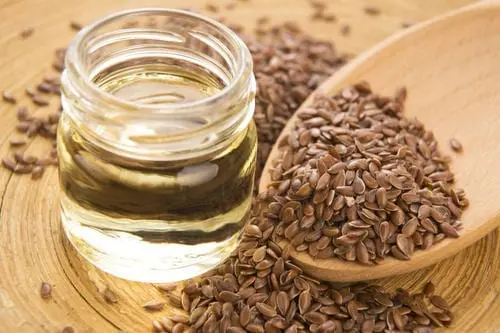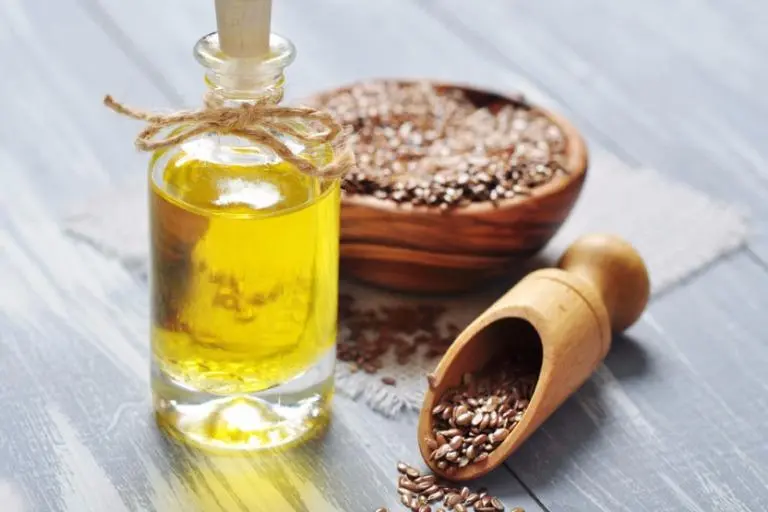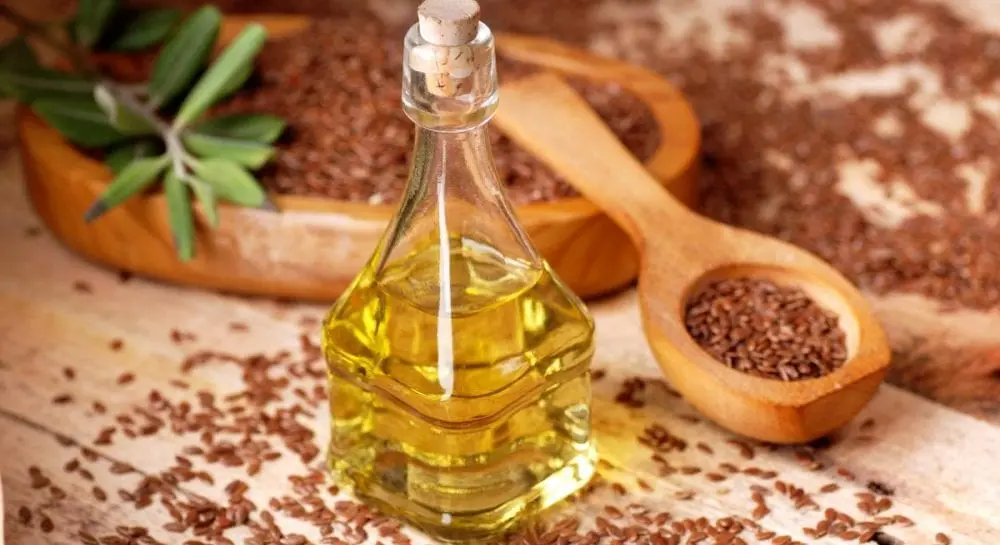Contents
Description
Linseed oil, as you might guess, is squeezed from the seeds of a plant called flax, and not just flax, but ordinary or sowing. It belongs to the type Flax and the Flax family (flax sits on flax and drives flax!). In Latin, the name of the product we are interested in sounds like oleum lini.
The seeds of the plant are harvested on special plantations before they become oil. It happens that seeds of wild-growing flax are also used. After that, they are exfoliated from the shell using special units, including manual ones.

Flaxseeds can contain up to 50% oil.
It is this amount of oily substance that is extracted from these grains by cold pressing, although most often this figure fluctuates within 30%. If the production uses hydraulic pressing at high temperatures, the oil yield can be up to 80%.
Linseed oil production
So, as I noted above, the raw materials are pre-peeled, cleaned, crushed, tableted and dried in order to then go under the press.
The primary pressing stage takes place under high pressure using a screw machine. The resulting product is then filtered. The cake remaining after receiving it looks like huge flax pies, containing about 10% more oil, which is also isolated from the specified raw materials by extraction, that is, using a solvent.
This process consists of two stages – first, Linseed oil is extracted from the seeds by adding solvents to it. And then these same chemical agents are removed from the resulting mixture using a distiller. The product obtained in this way significantly reduces the amount of vitamin E and other valuable nutrients. In addition, it contains more free fatty acids, which make the taste and smell of the product worse, and also shorten the shelf life.
The oil of the first extraction after filtration can be left unchanged, and then it will be unrefined. But quite often it is purified from all natural impurities using chemical processes, as well as heat treatment to obtain a refined product.
Flaxseed oil neutralization
It then undergoes a neutralization procedure to get rid of free fatty acids. Discoloration strips the product of pigments, phospholipid residues and substances that can cause oxidation. Deodorization completes the Linseed oil purification process by completely removing its odors. The result is a clean, transparent, oily slurry of greenish-yellow color, odorless and tasteless.

Commercial unrefined Linseed oil is often obtained from seeds heated to 120 ° C using a press-extruder and treated with chemical solvents. However, in this case, it is no longer considered a cold-pressed product. As a rule, such flax seed oil is additionally processed after pressing – it is settled, filtered, centrifuged, treated with hot water to remove turbidity and sediment (hydrated), and neutralized.
Composition and calorie content.
Vegetable fats from flax seeds is a raw-pressed product – it does not undergo heat treatment and does not lose its beneficial properties due to the destruction of useful elements by high temperature. If the manufacturer indicates that a wooden press was used for cold pressing, this is the ideal product with minimal oxidation. It has a beautiful golden color (sometimes brown), does not have a strong odor and has a slightly nutty taste.
Linseed oil contains many vitamins and fatty acids, which makes it much more beneficial for humans than vegetable and even butter:
- Vitamins A and E are essential for the health and beauty of skin, nails and hair.
- Vitamin F has a direct effect on the health of all human skin.
- Vitamin B is important for a good metabolism and slows down aging.
- Potassium affects the quality of mental processes and the state of the cardiovascular system.
- Iodine is essential for the synthesis of hormones by the thyroid gland. Growth, the ability of a man to continue childbirth and metabolism largely depend on iodine.
- Zinc is vital for the growth and strength of bone tissue, for tissue regeneration and for the full development of the brain.
- Phosphorus is even more important in bone formation than zinc. It is thanks to phosphorus that calcium is assimilated in the bones.
- In terms of the content of omega-3 fatty acids, it surpasses even fish oil! Only half a teaspoon of flaxseed contains its daily requirement.
The composition of vegetable fats from flax also includes other fatty acids of the omega group, phytosterols and lignans – strong antioxidants with properties beneficial to humans. This is a fairly high-calorie product – its energy value is 884 kcal.
History
The cultural history of flax begins about 9 thousand years ago in India, where the first linen fabric was made. Gradually, she replaced clothing from animal skins, and the ancient Indians began to grow this unpretentious plant for yarn.
However, another two thousand years passed before the inhabitants of Assyria and Babylon tried on linen clothes, and from here, thanks to its proximity to international trade routes, flax migrated to Egypt, the Mediterranean, Ancient Greece and Rome.

The technique of cultivation of flax was especially developed in Egypt – the “father of history” Herodotus spoke with admiration about a large piece of the finest linen fabric presented to Athena of Rhodes by the Egyptian king Amasis. Light, almost transparent Egyptian linen fabrics were sold literally worth their weight in gold: they put fabric on one side of the scales, and gold bars on the other.
Around the beginning of our era, flax growing, which became widespread in Rome, and then throughout the vast territory of the Roman Empire, reached Eastern Europe. It is interesting that here linen clothes were worn by commoners, in contrast to Egypt and Rome, where it was the property of the nobility.
For our ancestors, flax was one of the most important crops. The whole of Europe was wearing linen until the beginning of the 20th century and before the advent of cheap cotton.
And if at first flax was grown only for the production of fabrics, then its other useful properties were later discovered. They began to grind flour from flaxseed and crush Linseed oil – bread and cakes were baked from flour, and flaxseed oil was added to food on fast days.
Flaxseed oil flavor
Linseed oil is bitter. Flaxseed oil is a product with a strange taste and an even weirder smell. The fact is that unrefined Linseed oil obtained from flax seeds by cold pressing is bitter.
Yes, if it is not cleaned of natural impurities, then it is noticeably bitter. Perceptible, but not disgusting, not all-encompassing, but perceptible enough … If your butter tastes more like rancid, then it has simply gone bad.
The benefits of flaxseed oil
As with any product with a wide range of active substances, in addition to the indisputable benefits for humans, it also has its own contraindications. Do I need to use this product, its composition and recommendations for use later in this article.

Indications for the use of the main active ingredient in flaxseed pressing, alpha-lipoic acid:
- Disorders of the nervous system.
- Alcoholism.
- Liver disease.
- Poisoning the body with toxins.
- Skin problems.
- Overweight.
- Oncological diseases.
- Problems with memory and attention span.
- For burns, cuts and abrasions.
- For some skin diseases.
- Fight against parasites.
- Diabetes.
For men.
It may be particularly interesting for men that alpha lipoic acid is indicated for use in sports. At the same time, if you use dietary supplements with alpha-lipoic acid, it is recommended to increase physical activity. What are the main benefits of such supplements? By strengthening the heart, normalizing metabolism and helping to burn excess fat, increased stress will not harm the body.
With active strength training in the body of men, there is an excessive accumulation of free radicals, and free radicals cause oxidative muscle tension. Taking alpha lipoic acid relieves this stress and speeds up the recovery of the athlete’s body after intense exertion.
Typically, athletes do not consume flaxseed oil internally, but take alpha-lipoic acid in the form of tablets and capsules, or as a dietary supplement to the main diet. The consumption rate of the drug for men is 200 mg 4 times a day after meals. When the intensity of the load is increased, the dose can be increased to 600 mg. Since the drug has contraindications, it is advisable to consult a doctor before using it.

A separate property of vegetable fats from flax that is interesting specifically for men is the enhancement of sexual function.
For women and pregnant women.
Due to the complexity and confusion of all biological processes during pregnancy, pregnant and lactating women need to be very careful about the use of all drugs and taking flax oil is no exception. Although no significant harm was seen from ingestion of flaxseed oil during pregnancy, some studies suggest an increased risk of preterm birth from consuming it in the second and third trimesters.
Despite the contraindications during pregnancy, women will be interested in the anti-aging properties of linseed oil extraction. Although its use does not promise eternal youth, it has a good effect on the condition of the skin, hair, nails and, in general, increases the body’s immunity.
Vegetable fats from flax and their derivatives are widely used in cosmetology. Creams based on it not only moisturize and soften the skin, but also have anti-aging, antibacterial and regenerating effects. If you are inclined to experiment and are not biased towards traditional medicine, you can try a mixture of honey and flaxseed to treat acne. For the treatment of weak, split ends, or excessive dryness of the scalp and the appearance of dandruff, you can use masks based on it.
For kids.
It is difficult to overestimate the usefulness of flaxseed oil for the growing body of a child. Iodine, zinc and phosphorus help to form a strong and healthy skeleton with strong bones and have a positive effect on the growth of the child. Potassium helps a still-not-strong nervous system to deal effectively with stress. Fatty acids regulate metabolism, which has a positive effect on the child’s physical activity. Regular use of this product and its derivatives by a child improves his learning ability, the ability to navigate in the surrounding space, and master fine motor skills.
The most beneficial use of Linseed oil by children in the winter – the child will be less prone to colds.
In addition, if a child cannot cope with physical and mental stress, this may be an indication for the use of alpha lipoic acid. For children, the dosage of the drug is not large and ranges from 12.5 mg to 25 mg per day. Of course, you should not experiment on your own with the intake of alpha-lipoic acid, and before giving the drug to a child, you should consult a doctor. The doctor can also, if necessary, increase the daily dose of the drug and explain in detail how to use flaxseed oil with health benefits.

The cardiovascular system.
The main active ingredient in linseed oil that benefits the body is alpha lipoic acid, which is an effective antioxidant. The benefit for humans of this acid is that it neutralizes the oxygen that accumulates as a result of stress, overwork and exposure to ultraviolet radiation. As a result, alpha-lipoic acid inhibits the process of oxidation of tissues and organs, which has a beneficial effect both on the entire body as a whole and on the cardiovascular system in particular. Also, alpha-lipoic acid strengthens the heart muscles and relieves excessive stress from them.
Studies have shown that the benefits of Linseed oil reduce the risk of stroke by 37%. And its property to burn excess fat and normalize blood cholesterol levels prevents clogging of blood vessels with cholesterol plaques.
Harm and contraindications of Linseed oil.
With all the beneficial properties of flaxseed vegetable fats, there are contraindications to their use. It is worth contacting a doctor about taking it in the following cases:
- with pancryotitis;
- acute cholecystitis;
- stomach ulcer;
- bowel diseases;
- during pregnancy and lactating women;
- women with hormonal imbalances;
- when taking courses of drugs, it is worth asking about possible allergic interactions of the body with their components.
Rules for the selection and storage of Linseed oil.
Flax press tends to quickly oxidize in air and deteriorate. Therefore, always look at the oil release date and choose as fresh as possible. It can be stored from 3 months to a year, depending on the method of its manufacture and packaging. The recommended storage location is glassware – pour the oil over if purchased in a plastic container. Dark glass is best suited for storage.
In any case, whatever the packaging, the Linseed oil must be stored in a dark and cool place – under the influence of ultraviolet radiation, it quickly loses its healing properties. Just thirty minutes in the sun is enough for almost all fatty acids to be destroyed.

The lid must be tightly screwed on – with the lid open, the shelf life is no more than 60 days. If the product begins to noticeably bitter or sour, this means that it has already deteriorated and can be poisoned.
Flax seeds are best suited for storage. It is not recommended to store the oil for a long time – it is most useful fresh. This is the main reason that, for all its useful properties, it is not very popular. Over time, its composition oxidizes and loses many of its medicinal properties.
Store flax seeds in a sealed package (dish or bag) in a cool place. A refrigerator is best suited for these purposes. Nothing else is needed to store them.
When choosing seeds, you should pay attention to the date of production (the fresher the seeds, the better), to the absence of foreign debris in the seeds and to moisture – the seeds must be dry.
Linseed oil for weight loss
With regular consumption of flaxseed oil, weight loss is more active. First of all, due to the fact that this product helps to normalize fat metabolism and cleanse the body, it helps to regulate appetite. After two months of regular intake of flaxseed oil, extra pounds begin to go away faster than before.
How to use Linseed oil correctly
It is usually recommended to drink 1 tablespoon of flaxseed oil 1-2 times a day 20 minutes before meals. Duration of admission is 2-3 months.
During the spring beriberi, you can take 1 tablespoon of flaxseed oil on an empty stomach in the morning.










Алахым о